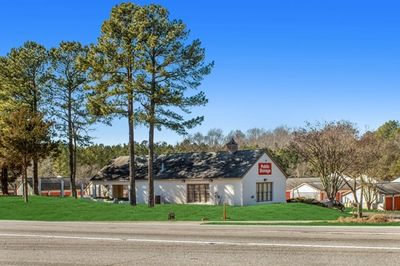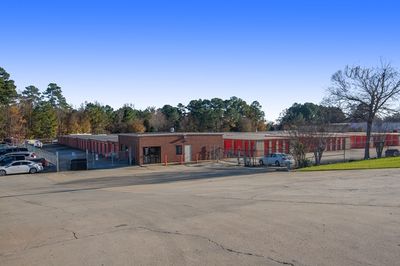Storage Types in Wake Forest
- Boat Storage Units in Wake Forest, NC
- Businesss Storage Units in Wake Forest, NC
- Vehicle Storage Units in Wake Forest, NC
- Climate Controlled Storage Units in Wake Forest, NC
- RV Storage Units in Wake Forest, NC
Other Storage Unit Options in Wake Forest, NC
Storage Unit Sizes in Wake Forest
- 5x5 Storage Units in Wake Forest, NC
- 5x10 Storage Units in Wake Forest, NC
- 5x15 Storage Units in Wake Forest, NC
- 10x10 Storage Units in Wake Forest, NC
- 10x15 Storage Units in Wake Forest, NC
- 10x20 Storage Units in Wake Forest, NC
- 10x25 Storage Units in Wake Forest, NC
- 10x30 Storage Units in Wake Forest, NC
About Wake Forest
Wake Forest is a mid-sized city in North Carolina's Wake County, just north of the state capital, Raleigh. In the early 2000s, Wake Forest became one of the fastest-growing suburbs in America, as its population exploded from just over 12,000 in 2000 to more than 40,000 by 2015. Its proximity to the North Carolina Research Triangle has led many families and young professionals to establish their homes in Wake Forest.
The History of Wake Forest
Wake Forest began as a quiet university town. Development of Wake Forest started in 1820, when Dr. Calvin Jones bought land in the area. In 1823, Jones became the area's postmaster. The town supported Wake Forest College, today known as Southeastern Baptist Theological Seminary. A school for boys, the Wake Forest Institute, opened in February 1834. At the beginning of the Civil War, the facilities owned by the institution became hospital for wounded soldiers.
In the 1830s, a New England doctor purchased just over 600 acres on forestland in Wake County, North Carolina. Few people lived in the area, which was known as the Forest of Wake, or Wake Forest. A short time later, the doctor sold some of the land to the North Carolina Baptist Convention. The organization established the Wake Forest Manual Labor Institute, later called Wake Forest College. In 1840, a railroad depot in the nearby community of Forestville began to bring new people to both the school and the surrounding Wake Forest community.
When leaders at the college persuaded the railroad to relocate nearer to Wake Forest in 1874, the town flourished even more. Originally, it was incorporated as the town of Wake Forest College, but eventually it became known as just Wake Forest.
Living in Wake Forest
You'll find a number of things to see and do in Wake Forest, ranging from historic points of interest to parks and recreational facilities. One of the most notable historic buildings in Wake Forest is the DuBois Center, a community center in the former 1926 W.E.B. DuBois School. There are many other nationally-registered historic sites in Wake Forest, including Rock Cliff Farm, the South Brick House and the Wakefield Dairy Complex. These sites, among others, give an interesting peek into the city's past. You can also learn more about Wake Forest's history at the Wake Forest Historical Museum, which houses many pieces of local memorabilia.
If you're looking for somewhere to enjoy the pleasant Wake Forest weather, you'll have 10 different parks and recreation centers to choose from. Plummer Park, the Smith Creek Soccer Center and Joyner Park are just a few of the city's parks. Many of the parks offer children's playgrounds, walking trails and picnic areas. The Falls Lake State Recreation Area is another major Wake Forest highlight. It's home to 12,000-acre Falls Lake, surrounded by thousands of acres of woodland. The park provides space and facilities for biking, hiking, canoeing and kayaking.
Wake Forest Schools
The schools in Wake Forest are part of the Wake County Public School System. There are several charter schools in Wake Forest, a few private schools and two Montessori campuses.
If you're hoping to pursue a college degree in Wake Forest, you can attend the city's local campus of Wake Technical Community College, which offers two-year degrees in a variety of fields.
Resources for Moving to Wake Forest
As you get ready for your move to Wake Forest, you might find the following resources helpful:
- Utilities: The town of Wake Forest supplies its residents with electricity, while the city of Raleigh provides water. If your home is in an outlying area, you may receive electricity from either Duke Energy or Wake Electric.
- Garbage and Recycling: The town facilitates regular collection of trash, recyclables and yard waste.
- Transportation: Public transit options in Wake Forest include the Wake Forest Bus Service, which offers both weekday commuter service and regular routes around town.
Wake Forest Housing
Whether you're looking for a condo, an apartment or a single-family detached home, you can find many options throughout Wake Forest. Both home and rent prices will be higher in Wake Forest than in many neighboring communities. Many of the single-family homes in Wake Forest are situated on large lots, surrounded by large trees and open space.




